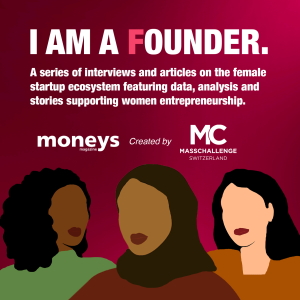Can you tell us about your background and how you got started with Naturbeads?
I have a master’s in chemistry, a PhD in materials engineering and an MBA. I worked as a researcher in Academia and in the chemical industry before deciding that I was not interested in a corporate career, and I wanted to have my own company. I worked for a couple of years in technology commercialization and venture building where I learnt some critical skills to understand which technologies from academia have the potential for commercialization. In 2017 my partner and a colleague at the University of Bath published a paper where they reported a new and innovative process to manufacture cellulose microspheres which received a lot of attention from the media and from cosmetics companies. These companies were aware of active and incoming bans on plastic microbeads in cosmetics and wanted to receive a sample of material to test. From my experience in technology commercialization this is quite unusual because for new technologies, materials or processes you need to do a lot of technology push to get attention from companies. It looked to me like this was something that had a strong potential for commercialization and I convinced them to set up a company to scale up the process. We spent the first year applying for funding, doing market analysis and speaking with investors and in 2019 we started our operations.

How does Naturbeads differentiate itself from other companies in the biodegradable and sustainable materials industry?
![]() We use a material, cellulose, that has been engineered by nature to be mechanically and chemically resistant, while at the same time 100% biodegradable. Plastic is incredible versatile, with great chemical and mechanical properties but it is made from fossil fuels (a non-renewable resource, contributing to greenhouse gases) and it is not biodegradable. Other biomaterials like starches are fully biodegradable but their mechanical properties are not optimal.
We use a material, cellulose, that has been engineered by nature to be mechanically and chemically resistant, while at the same time 100% biodegradable. Plastic is incredible versatile, with great chemical and mechanical properties but it is made from fossil fuels (a non-renewable resource, contributing to greenhouse gases) and it is not biodegradable. Other biomaterials like starches are fully biodegradable but their mechanical properties are not optimal.
What have been some of the biggest challenges you’ve faced as a woman founder in the tech industry?
It is well known that most VCs are men, and, in their search for the next startup to fund, they look for the stereotypical successful startup founder, someone like Mark Zuckerberg, a young dropout, white male, with a background in computer science or engineering, ambitious, with a preference for a casual dress code (t-shirts and hoodies). I do not fit with this description but I am ambitious and I strongly believe in our mission and that we have a differentiating technology. This means that I did not give up until I found the right investors who believed in our technology and were open to hear from ‘non-stereotypical’ founders.
Has Naturbeads received support from investors? If so, can you walk us through the process of finding investors and the challenges you faced in that process?
Yes, Naturbeads has been successful in raising investment. Our investors are Sky Ocean Ventures (now part of Founders Factory), Progress Tech Transfer, EOS Advisory, angel investors (family and friends) and an industrial strategic investor. Finding the right investors has been the hardest challenge as a female founder. As a founder you have to build a lot of resilience and not to be discouraged by rejection. And as a female founder statistically you will receive more rejections. But there are great investors which are truly open to evaluating your company and your ideas in an open way. If you are a female founder and prepare and plan for a little more extra time, I am confident you will succeed.
According to a research conducted by BCG and MassChallenge, when female entrepreneurs present their ideas to investors for seed capital, they receive significantly less – a disparity that averages over 1 million dollars – compared to men. However, businesses founded by women ultimately generate higher revenues – more than double per dollar invested – compared to those founded by men, making women-led companies better investments for funders. As a female founder, how much do you identify with this study and what are your personal opinions on the matter?
I read about this study and in my limited experience I have to say it sounds reasonable. Most investors continue to use an old paradigm according to which if you invest in 10 startups, statistically 9 will fail but the successful one will make you enough money to cover for the losses. I am sure this paradigm works well in IT, where if you invest in the next Facebook or Twitter you hit the jackpot. But what if this paradigm does not work in hardtech, or cleantech, or medtech where you need years of R&D and technical experience? What if instead of looking for the next Mark Zuckerberg you invest in 10 solid technologies, with a team with a strong technical background and years of business experience? What if 8 or 9 or 10 out ten startups in your portfolio are successful? What if female entrepreneurs, black entrepreneurs, and other minorities entrepreneurs were the last untapped resource of future successful startups? Wouldn’t you, as an investor, want to take advantage of it? Some smart investors have already understood this. I am glad I can count them among my investors.
 The team is crucial to the success of a startup. How do you manage difficulties, misunderstandings, and conflicts within your team and what does it make a team successful in your opinion?
The team is crucial to the success of a startup. How do you manage difficulties, misunderstandings, and conflicts within your team and what does it make a team successful in your opinion?
I am proud of the team we built at Naturbeads. We hire based on attitude and all team members take ownership of the work they need to complete. Even in my busiest weeks I find the time to meet with the team once a week. This weekly meeting is the space where we share updates about the business, technical challenges and where every team member can raise their concerns and know that they will be listened. We support team members even when they decide to leave because we want everyone to follow their passions and to be successful and I do believe this strengthen the commitment of those who stay with us.
What advice would you give to other women who are looking to start their own businesses in the tech industry?
I do believe that women have the same if not higher chances of success in the tech industry as men. They might raise less funding, but this means that they learn how to succeed with less money, they take calculated risks and in the long term they build more successful businesses. Investors are finally taking note of these statistics and there are more and more investors and funds dedicated to women. If you are a woman entrepreneur and have a business idea, look for the right investors who have in their portfolio startups with female founder, and take your chance.
Have you ever find yourself in situations where you had the feeling to be undervalued because of your gender? In this case, what did you do and how can this kind of discriminations prevented to happen?
I am in my early fifties, I cannot count all the situations where I know I was undervalued because of my gender. I never accepted it, I fought it, and if I knew it was a lost battle I moved on. I changed jobs, I changed countries, I changed partners. Now I have a partner who is my life companion and business partner, who respects me and supports me. I founded my own company where women (and men) know they will be treated equally, with same career opportunities, salaries and promotions. I think one way to stop the discrimination is to share more stories about successful women (to create new stereotypes), more statistics about women entrepreneurs (to show that women are a safer bet), then finally employers, managers and investors will start to understand that women are a resource, and they are worth investing in.









